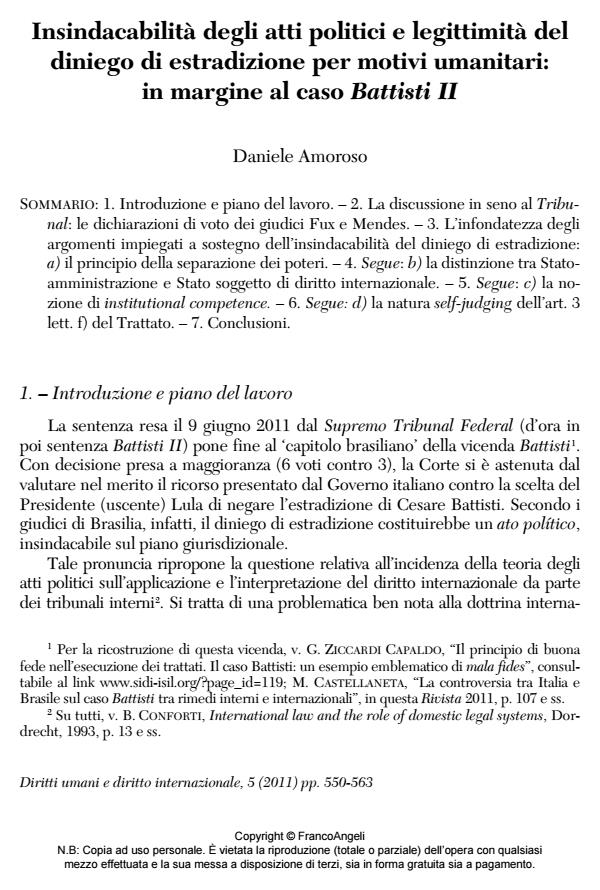Insindacabilità degli atti politici e legittimità del diniego di estradizione per motivi umanitari: in margine al caso Battisti II
Titolo Rivista DIRITTI UMANI E DIRITTO INTERNAZIONALE
Autori/Curatori Daniele Amoroso
Anno di pubblicazione 2011 Fascicolo 2011/3
Lingua Italiano Numero pagine 14 P. 550-563 Dimensione file 187 KB
DOI 10.3280/DUDI2011-003005
Il DOI è il codice a barre della proprietà intellettuale: per saperne di più
clicca qui
Qui sotto puoi vedere in anteprima la prima pagina di questo articolo.
Se questo articolo ti interessa, lo puoi acquistare (e scaricare in formato pdf) seguendo le facili indicazioni per acquistare il download credit. Acquista Download Credits per scaricare questo Articolo in formato PDF

FrancoAngeli è membro della Publishers International Linking Association, Inc (PILA)associazione indipendente e non profit per facilitare (attraverso i servizi tecnologici implementati da CrossRef.org) l’accesso degli studiosi ai contenuti digitali nelle pubblicazioni professionali e scientifiche
With a majority judgment delivered on 9 June 2011, the Supremo Tribunal Federal definitively ended the ‘Brazilian chapter’ of the Battisti case. Notably, the majority refused to pronounce itself on the appeal lodged by the Italian government against the denial of extradition of Battisti by the (outgoing) President Lula, having established that the latter was a political act immune from judicial scrutiny. This finding was justified by the Tribunal on the basis of three rationales. Firstly, by relying on the principle of separation of powers, the majority maintained that foreign affairs choices (including that of denying extradition) are constitutionally committed to the Executive alone and cannot be reviewed by courts. Secondly, it affirmed that national courts cannot assess the legality of acts carried out by their own State as a subject of international law. Thirdly, it stated that the Judiciary lacks institutional competence to deal with foreign affairs-related matters. Besides this, it is worth recalling that the Brazilian Advocate General suggested to reject the Italian appeal because of the selfjudging nature of the humanitarian exception set forth by art. 3 lett. F) of the Extradition Treaty between Italy and Brazil. The present article tries to confute each of these arguments, by arguing that the Tribunal should have ruled on the merits of the case.
Daniele Amoroso, Insindacabilità degli atti politici e legittimità del diniego di estradizione per motivi umanitari: in margine al caso Battisti II in "DIRITTI UMANI E DIRITTO INTERNAZIONALE" 3/2011, pp 550-563, DOI: 10.3280/DUDI2011-003005